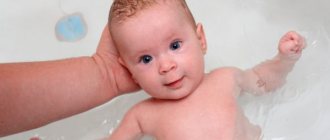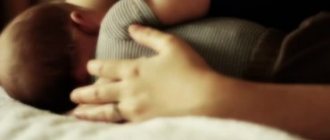Newborns who have spent 9 months in amniotic fluid do well in water, so most babies enjoy bathing. They calmly accept immersion in a warm bath and willingly allow their mother to wash them. Grown-up children, from about 1.5-2 years of age, begin to approach the bathing process with concern.
Parents should not be scared right away - people have a natural fear of water, and it can manifest itself in different ways. A child may calmly allow himself to be bathed, but experience panic at the sight of large bodies of water, or, conversely, suddenly be afraid to swim in the bathtub at 2 years old, although yesterday he was very happy about washing and loved to play in the water with rubber ducks and balls.
Conquer your fear
“The fear of the first bath may be due to the large space in the bathroom, as well as the parents’ uncertainty. Keep in mind that the first experience is always exciting, but everything should be in moderation,” says pediatrician Polina Kizino .
The child reads the parent's attitude. He feels especially strongly whether his mother, with whom he recently shared a life together, is worried. If you are worried, ask for advice, study the information, calm down. Since you need to bathe your newborn every day, over time you will become a professional!
Prepare in advance everything your baby will need after bathing: clean clothes, a diaper, diaper cream or spray, a towel. Bathe your newborn with an assistant. Perhaps in such a situation, dad’s strong and confident hands are better suited for bathing the child, but everything is individual. And one more little tip: sing a funny song or talk affectionately to your baby. Many children are distracted by a calm, familiar voice and are not afraid.
Reasons for fear of water
Before you figure out what to do with your baby’s fear, find the reason for its appearance. The hygiene procedure often causes serious discomfort, and the occurrence of a phobia is often preceded by an unpleasant situation: the baby slipped, fell or hurt himself.
- Water pressure too strong. Babies are frightened by its noise or the sensation when the jet touches the skin.
- Liquid getting on the face, inside the nose, ears. Water inside the ear can trigger the growth of bacteria and cause pain. The feeling of liquid on the face is unpleasant for babies.
- The shampoo got into the mucous membrane of the eye and caused a sharp pain. This is a common reason: parents switch to products for older children too early.
- During the hygiene procedure, the parents yelled at the baby. He defends himself against adults with hysterics, because he is afraid of causing anger again. Indirect reasons often include: tense relationships between parents, their quarrels and conflicts.
- Uncomfortable water temperature.
Children over one year old have a developed imagination; they imagine something inside the drain hole. Babies may be afraid of water due to the change from a small plastic bath to a regular, spacious one. It is easier to rid your child of fear if he already knows how to talk.
Come up with a ritual
Consider a ritual that will always precede bathing. For example, you can turn on music, give your child air baths and, while gently stroking him, sing songs or give a light massage. You can even turn on the same music so that the baby understands that something pleasant is about to begin. However, all these rituals are relevant only when the child does not have a panic fear of bathing, that is, he is already accustomed to the fact that it is fun, mom is happy, dad sings, everyone is calm.
It would be a good idea to have a bath every day at approximately the same time. We are not talking about clear limits, but it is better that the difference in bathing time from day to day is no more than half an hour.
Another advice from the pediatrician: “This applies to the smallest children in the first months of life - it is advisable to wait with them for at least 30-40 minutes after feeding to reduce the risk of regurgitation.”
Create suitable swimming conditions
Should I boil the water?
Of course you know: no. But if where you live the water is very hard or you are not sure of its good quality, then you can boil the bathing water for the first two months.
What should the water temperature be for the first swim?
“The water temperature for a newborn should be approximately equal to the mother’s body temperature (about 37°C), since these are the most familiar conditions for him. Then you can gradually reduce the temperature by 0.5 degrees, paying attention to the baby’s reaction - there should be no discomfort or anxiety,” says Polina Kizino.
It is necessary to control the water temperature with special safe devices. For example, the NUK Ocean thermometer is filled with pure rapeseed oil, a natural product that will not cause any harm even if it spills for any reason.
The air temperature in the bathroom should be 28 degrees - this will reduce stress at the moment when the child is taken out of the water and wrapped in a towel to dry the skin.
Should I add string, chamomile or other herbs to the water?
Everything here is individual: herbs dry out the skin and can cause an allergic reaction, so use them only after consulting a doctor.
What should a bath be like?
“Bathing in a large bathtub or a baby bath is a parent’s choice. Baby baths are usually more comfortable for the parent’s back, but in a regular bath there is more space for swimming,” says pediatrician Polina Kizino. One thing is clear: if you don't have a small bathtub, don't buy it. Try the option with a large bathroom, and then decide on the situation - it’s never too late to buy.
What to do: your child is afraid to take a bath
Advice from experts who have studied the behavior of children after stressful situations will help overcome fear:
- To prevent slipping, you should buy a small rubber mat. It will not slide along the bottom (for babies, buy a special slide or a bathing chair);
- You should always check the water temperature before swimming (it is best to maintain 36-37 °C);
- Many children find the process of washing their hair very unpleasant. This should be done no more than once a week, using special “tear-free” shampoos;
- if the baby is afraid of getting a certain part of the body wet (stands calmly in ankle-deep water, but refuses to sit down), then you need to calmly and with understanding treat his fear. Immersion should be slow and gradual;
- It is advisable to try to show that bathing is a fun, exciting process. You can use water toys - boats, rubber fish or ducks, small watering cans and soap bubbles.
Bathing should take place in a calm atmosphere. If you feel indecisive, you can ask your grandparents for help. Older children (2-3 years old) can be asked to try washing dishes (unbreakable). They will enjoy repeating the actions of adults and their fear of water will gradually pass.
It’s a good idea to sign up for a swimming pool with your baby; it’s also useful for general physical development. It is important that parents are nearby for the first few sessions and show the beginning swimmer that spending time in the pool is fun and exciting.
Choose your bathing products
Polina Aleksandrovna Kizino notes: “As for bathing products, you should use only those that indicate that they can be used from birth. It is advisable to give preference to products from time-tested manufacturers.
When choosing products for bathing a newborn, you need to be extremely vigilant: the product must have a neutral acidity level for the skin, that is, a pH of 5.5, so as not to irritate or dry out the baby’s delicate skin, and it should not contain preservatives or dyes, as little fragrance as possible and no mineral oil.
In any case, use the product with caution the first time. If your child is prone to allergies, try washing a small area of your baby's arm with this product or gel to make sure there is no reaction.
We recommend hypoallergenic products from the German brand Bübchen, which has been producing baby skin care products for over 50 years. Bübchen gels and bathing products, soaps, shampoos and creams have long become the favorites of many mothers because they do not dry out or irritate the skin, and they make the baby feel comfortable both during and after bathing.
Moreover, based on the results of tests and clinical studies, it became known that Bübchen products are suitable even for basic care for children with allergic diseases and skin reactions.
Ways to overcome fear in children over one year old
You can try to come to an agreement with a one-year-old baby. The best help for solving the question of how to overcome the fear of water will be game techniques:
- In the bathroom, blow soap bubbles, create colorful foam on the surface of the water, use finger paints, and read special books. Let your child understand that many things are allowed while swimming: immersing books in the water, smearing paints on the walls of the bathtub.
- Use role-playing games: let the baby pretend to be a dolphin and joyfully flounder. Watch cartoons about the inhabitants of the ocean with him, let him try on the image of the hero he likes. Tell him about the inhabitants of reservoirs, watch educational films.
- Ask your baby to dip the toy. He will see that his favorite toys are calmly bathing and will want to join them. At the same time, focus on the fact that you will get the baby at his first request.
- If your preschooler's fear is ingrained, reintroduce him to liquids. To do this, periodically pour warm water into a cup throughout the day. Allow your baby to throw objects of different weights into the liquid. Some will drown, while others will not. Ask to put your hands in a cup of water. After two years, conduct classes using the Montessori method. A well-known teacher recommends that children rinse children's dishes in a bowl of liquid and then place them on a towel. You will soon notice that your preschooler has stopped throwing tantrums in the bathroom.
- Combine the hygiene procedure with an evening fairy tale. If you are used to washing your child in the morning, teach nursery rhymes, read poetry, sing.
- Give the baby freedom of choice, let him control the process. Consult with him on questions: how much water to pour, when to take out the stopper, what toys to take with you.
You should not force your child to immediately immerse himself in the bath. First, let him at least wet his feet a little, and then begin to sit down. Sometimes, so that the baby is not afraid, limit yourself to a shower, comparing it to rain. Preschoolers agree to it more readily; it seems to them that they will become adults faster.
Psychologists recommend that babies take every small step towards normal bathing. With the help of approval, he can more easily get rid of his fear.
Use bathing equipment
“A neck ring can be used from the moment the child begins to confidently hold his head up, a bathing slide can be used from birth, and a bath chair can be used from the moment the baby begins to sit confidently on his own,” says our expert. “But none of these devices mean you can walk away and leave your child swimming alone.” This is unsafe and therefore unacceptable. Remember that safety comes first!”
And finally, the basic rule for teaching a child to bathe from Polina Kizino: “The most important thing for adults is to behave confidently. Don’t worry if you don’t get everything right the first time, and don’t try to do everything at once. Do what is comfortable for you and your child at the moment and does not cause too much anxiety.”
Polina Alexandrovna Kizino
Why did the child become afraid to take a bath?
It is important to understand the reason why your baby is afraid to wash himself and not try to force him into the bath. Reasons for fear may vary:
- during the previous bath, the baby froze or felt discomfort due to incorrectly adjusted water temperature;
- hit or fell;
- shampoo, soap or other detergents get into your eyes and sting;
- swallowed water, accidentally going under water with his head.
If your baby fell yesterday, hit himself painfully in the bathroom and is now afraid of water treatments, you can try going without bathing for 2-3 days (use wet wipes). During this time, the baby will have time to forget the fall and his fear. Screams and attempts at atonement by force, on the contrary, can lead to stress or worsening fear, which can turn into an obsessive phobia.










